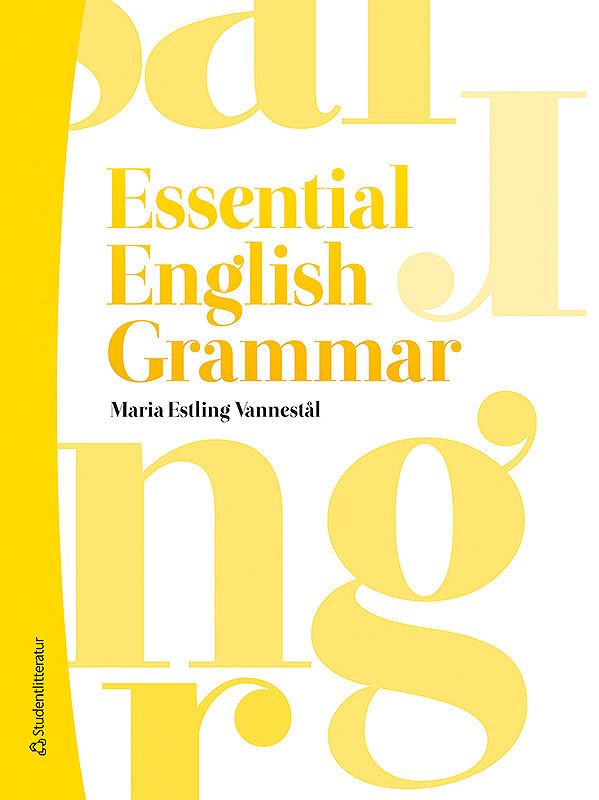

Essential English Grammar
Skickas följande arbetsdag
Hitta produkten hos våra återförsäljare som levererar utanför Sverige
- Preface
- 1Grammar all around us
- 1.10Why learn grammar
- 1.21Grammar and the world
- 1.2.11Grammar has meaning
- 1.2.23Language variation and change
- 1.34How to use this book
- 1.46A window on reality: using a language corpus
- 27Building a sentence
- 8Questions for problem-solving and discussion
- 2.10The building blocks of language
- 2.1.12Word classes
- 2.1.24Clause elements
- 2.1.37Grammatical phrases
- 2.29Sentence structure
- 2.2.19Main clauses and dependent clauses
- 2.2.21Avoiding run-on sentences
- 2.2.32Avoiding sentence fragments
- 5Brief revision
- 6Exercises
- 37Using nouns to talk about things around us
- 8Questions for problem-solving and discussion
- 3.12One or more? Singular and plural nouns in English
- 3.1.12Formula and crisis: plurals borrowed from other languages
- 3.1.23Sheep and Swiss: plurals without a plural marker
- 3.1.33Pyjamas, scissors and police: nouns which are always plural
- 3.1.45Damage and damages – different meanings in the singular and the plural
- 3.1.56Chapters 3 and 4 – logical plurals in English
- 3.27To count or not to count
- 3.39Expressing ownership in English nouns: the genitive and the of construction
- 3.40Expressing (in)definiteness: articles in English
- 3.4.10A method or the method
- 3.4.23In court – no article in English
- 3.4.34Music or the music? General and specific meaning
- 6Brief revision
- 8Exercises
- 41Using pronouns to talk about things around us
- 2Questions for problem-solving and discussion
- 4.15Personal pronouns
- 4.1.16Pronouns and gender in different languages
- 4.1.26Money → it, scissors → they
- 4.1.36There expressing existence
- 4.28Demonstrative pronouns
- 4.39Possessive pronouns
- 4.40Interrogative pronouns
- 4.4.10What or which
- 4.4.21Who or whom
- 4.4.31Whose or who’s
- 4.52Relative pronouns
- 4.5.12Which, who or whom
- 4.5.24That and the zero relative
- 4.5.34Whose and of which/whom
- 4.5.45Is the relative clause necessary or not
- 4.66Quantifying pronouns
- 4.6.16Some and any – a matter of meaning rather than form
- 4.6.27Anyone who or the one who – general or specific meaning
- 4.6.38Everybody/everyone – plural meaning, singular form
- 4.6.49Each other
- 4.6.59Quantifiers and uncountable/plural nouns
- 4.6.60The whole of China
- 1Brief revision
- 3Exercises
- 55Using verbs to talk about what we do
- 6Questions for problem-solving and discussion
- 5.11Main verbs and auxiliary verbs
- 5.23The do-construction
- 5.34I’m singing or I sing? Progressive and simple verb forms
- 5.3.15The progressive form (I’m singing
- 5.3.26The simple form (I sing
- 5.47The study was made in 2010 – passives in English
- 5.58Can/could and will/would: the modal auxiliaries
- 5.5.19Can – could
- 5.5.200May – might
- 5.5.300Must – have /got/ to – ought to
- 5.5.401Will – would
- 5.5.501Shall – should
- 5.5.603Used to
- 5.604Walk and go – regular and irregular verbs
- 5.705Verbs and time
- 5.7.105He loves but they love – subject-verb agreement in English
- 5.7.207Now and then – present and past
- 5.7.309Talking about the future in English
- 5.7.411If only … – conditional constructions
- 5.812We decide to go but we avoid going: combining two main verbs in English
- 5.8.112Verbs followed by a to-infinitive
- 5.8.213Verbs followed by a bare infinitive
- 5.8.314Verbs followed by a verb in the ing-form
- 5.8.415Verbs belonging to more than one group
- 5.916Verb forms after prepositions
- 20Brief revision
- 22Exercises
- 625Using adjectives, adverbs and adverbials to describe things and situations
- 26Questions for problem-solving and discussion
- 6.129Adjectives and adverbs
- 6.230Good – better – best: Comparison of adjectives and adverbs
- 6.332The blind and the absurd – adjectives functioning as heads of noun phrases
- 6.435British and American – nationality adjectives (and nouns
- 6.536Different adverb types
- 6.5.136Happily and northwards – adverbs related to adjectives and nouns
- 6.5.239Always and here – adverbs which are not related to adjectives and nouns
- 6.640Adverbs and adverbials
- 6.742Adverbials and word order
- 6.7.142Adverbials in initial position
- 6.7.243Adverbials in mid-position
- 6.7.344To never go – the split infinitive
- 6.844However and moreover – adverbials linking parts of a text
- 47Brief revision
- 49Exercises
- 751Revision exercise and keys
- 7.152Revision exercise
- 7.253Key to questions for problem-solving and discussion
- 7.367Key to exercises
- 7.475Key to revision exercise
- 79Appendix
- 80Appendix 1 – Some common irregular verbs
- 84Appendix 2 – Nationality adjectives and nouns
- 90Appendix 3 – Useful expressions including prepositions
- 94Appendix 4 – Useful expressions including pronouns
- 95Appendix 5 – Useful expressions including numerals
- 97Suggestions for further reading
- 99Index
En översiktlig och bra handbok för alla som vill utveckla sin engelska
Information
- Författare:
- Maria Estling Vannestål
- Språk:
- Engelska
- ISBN:
- 9789144114606
- Utgivningsår:
- 2012
- Revisionsår:
- 2016
- Artikelnummer:
- 34106-02
- Upplaga:
- Andra
- Sidantal:
- 200
Digital produkt
Giltighetstid från aktivering: 60 mån